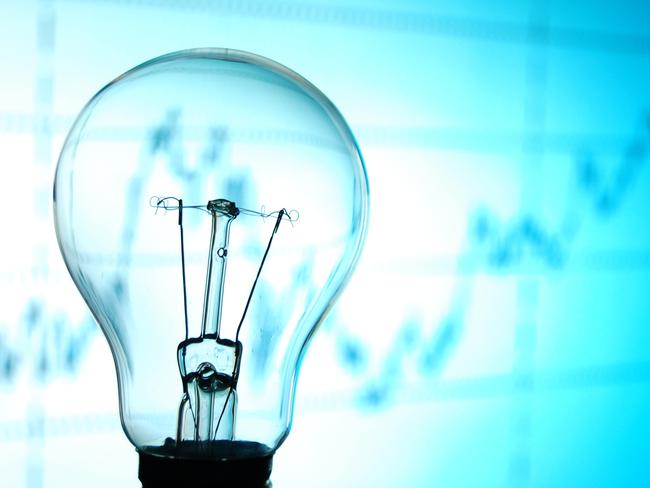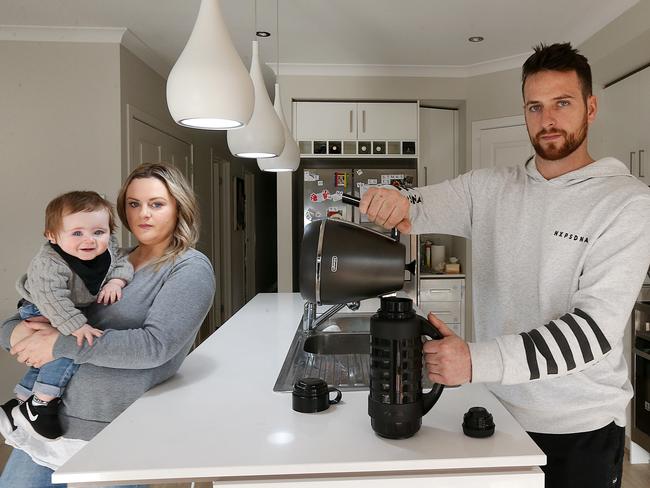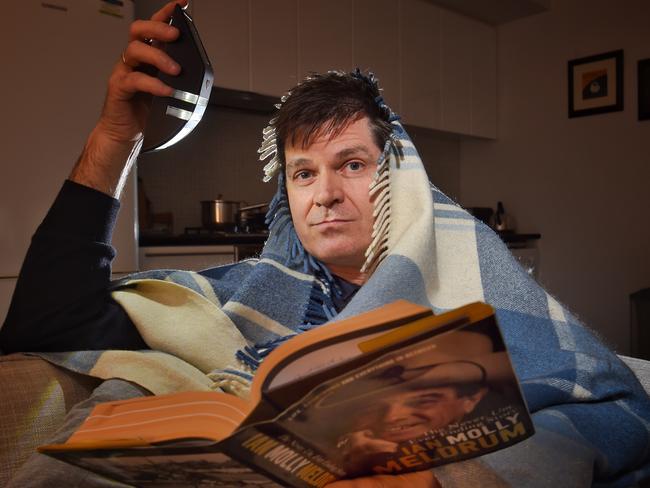Energy bills: Households paying inflated electricity and gas prices
HUNDREDS of thousands of households are paying inflated electricity and gas prices, an expert has warned. Here’s how you can save on your power bills.
News
Don't miss out on the headlines from News . Followed categories will be added to My News.
- Energy firms switch off thousands
- Quarterly power bill debt shock
- What the average family needs to survive
HUNDREDS of thousands of Victorian households are paying inflated electricity and gas prices because they don’t shop around enough, an expert warns.
Up to half of all customers don’t regularly review costs and are charged a premium that adds hundreds of dollars to annual bills, Vinnies spokesman Gavin Dufty said.
His latest analysis of Victorian tariffs suggests such households could save at least $300 a year on electricity and at least $100 on gas by demanding a better deal from their retailer or switching to a competitor.
The estimates relate to average-consumption households with combined electricity and gas and no solar panels.
As winter heating costs bite, Mr Dufty urged consumers to check whether a better rate was available.
“If you haven’t spoken to your retailer to update your deal or shopped around you are being dudded,” Mr Dufty said.

About 10 per cent of Victorians were on default prices known as ‘standing offers’ because they had never looked for an alternative. These were typically the most expensive.
However, Mr Dufty said many customers on ‘market offers’ were also being “fleeced” because they did not actively negotiate a new deal once generous discounts linked to one or two-year contracts lapsed.
“We estimate as many as 50 per cent of Victorians are paying well above the odds.
“There are those that have never shopped around, and those that also end up paying a premium because they simply accept what their company offers when their contract expires.
“What you need to do is turn the heat up and actively negotiate when those contracts end, and not assume that the new rates offered are the best available.”
Bundling gas and electricity with the same retailer was sometimes, but not always, the cheapest option.

Switching electricity retailers could be done within a month because smart meters allowed for remote rather than manual meter readings. Customers had to wait up to two months to swap gas companies.
An Australian Competition and Consumer Commission electricity prices inquiry has been told a confusing array of discounts and conditions makes shopping around too daunting for many.
Some percentage discounts were off entire bills, others off use and not supply, and others linked to direct debit and/or pay-on-time conditions. The highest advertised percentage discount was not necessarily best value.
The Consumer Action Law Centre has proposed introducing clearer comparisons, including displaying base rates and the average expected cost per year for a low, medium and high use.
FAMILY”S BID TO CUT EXPENSES
SINCE having a baby, Janelle Frew has seen her electricity and gas bills balloon.
Compromising on heating and baths for 10-month-old son Myles is out of the question. “Our last bill came to $500 for electricity and $200 for gas — it’s crazy,” Ms Frew said.

She and partner Nathan Palibrk, an electrician, have researched ways to reduce energy use.
“I fill up the kettle once in the morning and keep the boiled water in a Thermos for formula bottles,” Ms Frew, 26, said. “We keep the ducted gas heating at 18 degrees and close the vents in rooms we are not using, and keep the blinds down.”
They have two rooftop solar panels at their Plumpton home, and plan to install more to save over time. All their lights have been converted to LED globes.
Ms Frew also checks rival energy retailer prices to use as a bargaining chip with her provider.
“Last time, it saved us about $200 annually.”
DIM VIEW OF COSTS
LIKE many Victorians enduring the winter chill, Anton Nicholson is keeping a close eye on energy costs.
The quarterly electricity bill at his one-bedroom city apartment is about $320, up from about $260 a couple of years ago.
“As a single person, it is difficult to deal with rising energy costs when there’s still a mortgage and other bills to pay and no rebates or government assistance,” Mr Nicholson, 52, said. “I don’t leave the lights on when they are not needed, and I go to bed earlier in winter.”
He also uses a small solar light for the bathroom at night rather than switching on the main lighting.
Coping with energy costs was a conversation topic among family and friends.
“My sister pays a set amount monthly to avoid a big blowout in the budget.”
Mr Nicholson says solar power should be mandatory for new apartment builds.

ENERGY PAIN GETTING WORSE
STRUGGLING pensioners, retirees, families and singles are cutting back on heating, food and holidays to cope with the rising cost of essentials such as energy bills.
Electricity and gas price hikes are forcing many consumers to make dramatic adjustments, research reveals.
One in five Victorians who responded to a FiftyUp Club member survey ranked energy bills as the nation’s most important cost-of-living issue.
“People are telling us they are having to make big sacrifices,” the club’s senior campaigner David Liston said.
“It’s particularly tough for pensioners on a fixed income but the problem is not restricted to them. We’re also talking about everyday families and ordinary retirees.
“Rising energy costs are changing the shape of people’s lives.”
Combined electricity and gas bills have surged 88 per cent in Victoria in a decade, with households now paying an average $3270 a year, according to Australian National University modelling.

An upcoming Victorian Council of Social Service and RMIT University report warns people on low incomes and in poor health are making “trade offs” such as restricting heating and cooling; limiting cooking; reducing television viewing and giving children fewer baths so they can pay utility bills.
Some are resorting to borrowing money from family and friends or loan sharks charging exorbitant interest rates.
“It’s one thing to try to be more energy efficient; it’s quite another to live in the cold and dark, or seek food relief from community organisations, just to keep the bills paid,” it says.
Almost half of the 800 Victorian respondents to the FiftyUp Club survey said they were going without holidays so they could afford household bills. Two-fifths said they were cutting back on basics such as food, heating and electricity use.
For one-quarter, electricity accounts were the most stressful bills. Only health insurance fees caused more anxiety.
The FiftyUp Club uses the combined buying power of more than 280,000 members nationwide to secure exclusive discounts on expenses such as energy and insurance. Members are aged 50 and over.
News Corporation is a shareholder of the club’s parent company, One Big Switch.

ENERGY SAVINGS TIPS
SHOP around for a better deal using comparison sites such as compare.switchon.vic.gov.au
IF you are a pensioner, veteran or healthcare cardholder, check you are receiving concession entitlements.
CLOSE doors, curtains and blinds to keep warmth in when using the heater.
DRAUGHT-proof your home. Use a door snake, and seal gaps or cracks around your windows, doors, ceilings and floors.
DIAL down gas heating by a few degrees. You’re not likely to notice a huge difference in temperature.
INSTALL a thermostat you can program yourself. This allows you to set timers for the temperature in your house.
DRESS for the season so that you won’t need as much heating or cooling.
SWITCH off and unplug appliances when not in use, as electricity is still used in standby mode.
OPT for energy efficient CFL or LED light globes.
RELY on natural light as much as you can during the day. When you do need to use the lights, remember to turn them off when you leave the room.
USE an indoor clothes rack when it’s raining instead of the clothes dryer.
USE a hot water bottle instead of an electric blanket. If you do use an electric blanket, turn it on to warm up the bed before you get in. Then, turn if off before you go to sleep.
LOWER the temperature on your gas hot water heater a few degrees.
TAKE shorter showers.
TURN gas stove tops or ovens off just before the food is done, allowing it to cook with residual heat.
USE pots and pans with snug-fitting lids. That way they will heat up more quickly when covered.
COOK large amounts in the oven and freeze for a week. Using a microwave is more energy efficient and cheaper to run than an oven when reheating food.
STACK the dishwasher and don’t run it until it’s completely full, then connect it to cold water.
CHECK energy ratings when buying new appliances like an air conditioner, fridge, washing machine or dishwasher.
Source: ASIC, FiftyUp Club, finder.com.au


